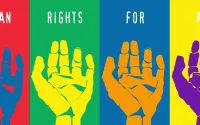August 2006

| Photograph by Mark Thiessen |

| At times he can seem like a biblical prophet, lamenting how our human failings are destroying the planet. Yet listen more carefully to Bill McKibben—environmental essayist, activist, and author of the best seller The End of Nature—and you'll hear a redeeming message that transforms the idea of what "green" can mean.By Bill McKibbenThis is the year when we finally started to understand what we are in for. Exactly 12 months ago, an MIT professor named Kerry Emanuel published a paper in Nature showing that hurricanes had slowly but steadily been gaining in strength and duration for a generation. It didn't attract widespread attention for a few weeks—not until Katrina roared across the Gulf of Mexico and rendered half a million people refugees. The scenario kept repeating: Rita choking highways with fleeing Texans; Wilma setting an Atlantic Ocean record for barometric lows; Zeta spinning on New Year's Day. Meanwhile, other data kept pouring in from around the planet: Arctic sea ice melting past an irrevocable tipping point; thawing permafrost in northeastern Siberia creating so much methane that lakes didn't freeze even in the depths of boreal winter; the NASA calculation that 2005 had been the warmest year on record. In January, a trinity of announcements sealed the mood. First, British scientist James Lovelock, who invented the instrument that allowed us to detect our eroding ozone layer, published an essay predicting that we'd already added too much CO2 to the atmosphere and that runaway global warming was inevitable. He predicted that billions will die this century. A few days later came a less dramatic but equally alarming announcement. The steady and long-serving NASA climatologist James Hansen defied federal attempts to gag him and told reporters that new calculations about, among other things, the instability of Greenland's ice shelf showed "we can't let it go on another ten years like this." If we did? Over time, the buildup of CO2 emissions would "imply changes that constitute practically a different planet." Less than ten years to reverse course. Not our kids' lifetimes, or our grandkids'. Ours. Finally, at month's end, even President Bush, as faithful a friend as the fossil fuel industry has ever had, announced America was "addicted to oil." Historians, I think, will look back on this as the time when denial finally began to crumble. When we finally began to understand that the planet as we've known it was at stake—and not from a possible scenario, like nuclear war, but from the consumption of the coal and oil and gas that power most of the actions of our lives. This is new. Humans have never faced a civilization-scale challenge before. Whether we deal with it gracefully or not depends, I believe, on what happens to that creed we call environmentalism. Environmentalism is mostly an American invention, one of the most powerful ideas we've offered to the rest of the planet. It arose here for a simple reason. We came to full consciousness while we were still in the process of subduing the nation's forests and prairies. In much of Asia and Europe, the woods were cut and the rivers tamed before the age of writers. Here, though, Henry David Thoreau could see the line between man and nature on his daily walks. George Perkins Marsh could watch what happened to the flow of streams when New England forests were cut down. Aldo Leopold could look on as the fierce green fire turned dull in the eyes of a gunned-down wolf. None of these environmentalists, or the hundreds of thousands of other women and men who believed passionately in such ideas, were able to slow the economic juggernaut that rushed across this continent, however. Most didn't think of that as their role; it didn't even cross their minds. They set up small islands of park and wilderness for the tide to rush around. And they worked, especially after Rachel Carson, to cure modernity's most toxic side effects, making sure certain chemicals were banned and the Clean Air Act passed. This movement has been remarkably effective. Even as our economy has grown larger, smog has also abated. We can swim in most of our rivers again. And our model has spread to the rest of the world. Other countries have adopted their own clean air acts, built their own national parks. And environmentalists can still win great victories: The Sierra Club and the Wilderness Society and all the rest have managed so far, for instance, to preserve the Arctic National Wildlife Refuge from drilling. But when it came time to deal with global warming, this kind of environmentalism flunked. Despite 20 years of increasingly dire warnings, American carbon emissions continue to grow; we won't even engage in the Kyoto Protocol, the one international effort to bring carbon emissions under some kind of control. A few western European nations are doing better, but even they are having trouble meeting their reduction targets. And the developing world is starting to flood the atmosphere with CO2 on an almost American scale. From 1990 to 2004, China's carbon emissions increased by 67 percent, nearly all of it the result of coal. We're now starting to realize this failure was almost inevitable. Environmentalism's method of handling global warming is flawed. The old paradigm works like this: We judge just about every issue by asking the question, Will this make the economy larger? If the answer is yes, then we embrace whatever is in question—globalization, factory farming, suburban sprawl. In this paradigm, the job of environmentalism is to cure the worst effects, and endless economic growth makes that job easier. If you're rich, you can more easily afford the catalytic converter for the end of the tailpipe that magically scrubs the sky above your city. But it turns out that, above all else, endless economic growth is built on the use of cheap fossil fuel. The industrial revolution began the day in 1712 that Thomas Newcomen figured out how to use a steam engine to pump water out of a coal mine, so that it could be mined more cheaply and easily, thus allowing more steam engines. Coal, oil, and natural gas were, and are, miraculous—compact, easily transportable, crammed with Btu, and cheap. Dig a hole in the ground, stick a pipe in the right place, and you get all the energy you could ever need. Precisely the same fuels that gave us our growth now threaten our civilization. Burn a gallon of gas and you release five pounds of carbon into the atmosphere. And as China demonstrates every day, the cheapest way to spur growth is by burning more fossil fuel. Even Benjamin Friedman, the Harvard economist who wrote a brilliant book last year defending the morality of economic growth, conceded that carbon dioxide is the one major environmental contaminant for which no study has ever found any indication of improvement as living standards rise. Which means we might need a new idea. We need to stop asking, Will this make the economy larger? Instead, we need to start asking, Will this pour more carbon into the atmosphere? Some of the shift would be technological. If carbon carried a real price, then we'd be building windmills far faster than we are now. All cars would be hybrid cars, and all lightbulbs would be compact fluorescent. Every new coal plant would be paying the steep price to separate carbon from its exhaust stream and store it underground. All that would help—but not enough to meet Hansen's ten-year prognostication, not enough to reduce worldwide carbon emissions by the 70 percent required to stabilize the climate at its current degree of disruption. For that to happen, we'd need to change as dramatically as our lightbulbs. We'd need to see ourselves differently—identity and desire would have to shift. Not out of a sense of idealism or asceticism or nostalgia for the '60s. Out of a sense of pure pragmatism.For instance, we've gotten used to eating across great distances. Because it's always summer somewhere, we've accustomed ourselves to a food system that delivers us fresh produce 365 days a year. The energy cost is incredible—growing and transporting a single calorie of iceberg lettuce from California to the eastern U.S. takes 36 calories of energy. What would it take to get us back to eating more locally, to accepting what the seasons and smaller scale local farmers provide? Or think about the houses we now build. They're enormous—more than double the size they were in 1950, despite the fact that the number of people in the average home continues to fall. Even a technologically efficient furnace or air conditioner struggles to heat or cool such a giant space—and the houses can only be built on big suburban lots, guaranteeing that their occupants will be entirely car-dependent. What would it take to make us consider smaller homes, closer to the center of town, where we could use the bus or a bike for daily transportation? It would require, I think, a movement that takes people's aspirations for good and secure and durable lives seriously. That takes those desires more seriously even than the consumer economy has taken them. We would need a kind of cultural environmentalism that asks deeper questions than we're used to asking. How deep? Here's a data set just as interesting as the ongoing spike in planetary temperatures—and almost as depressing. Since researchers started trying to measure such things in the years after World War II, the percentage of Americans who consider themselves "very happy" with their lives has remained steady, even though the material standard of living has nearly tripled in the same period. More stuff is not making us happier—but we can't break out of the cycle that offers more stuff as our only real goal. What we really seem to want, according to the economists and psychologists conducting such research, is more community. Standard economic theory has long assured us that we're insatiable bundles of desires. That may be true, but more and more it feels like our greatest wish is for more contact with other people. We've built the most hyper-individualized society the world has ever seen: According to some surveys, most Americans don't know their next-door neighbors, which is a truly novel idea for primates. That's contributed to the great success of our economy—each of us rises and falls based on our own efforts, which is a great motivator. But it's also contributed to that gathering sense of dissatisfaction, and to that cloud of carbon dioxide. If everyone has to drive their own car everywhere (and the biggest car possible, to maximize their own safety), then it's hard to reduce emissions. If our idea of paradise remains a 4,000-square-foot house on its own isolated lot, it's hard to imagine really rapid change. But there are at least glimmers of another possible future. Consider food again. Last winter I conducted an experiment: Could I get through the cold months in my northern valley eating just the food grown in my county? As it turned out, I didn't simply survive; I thrived. There were plenty of potatoes and onions and beets and beef and cider and beer and wheat and eggs, and just enough tomatoes canned in the heat of summer, to see me through. I'm sure I saved lots of energy, though I can't calculate just how much. What I can list, though, are the new friends I made, and they numbered in the dozens. My food cost more in terms of time; it wasn't as convenient to go to the farmers market as to the Shop 'n Save. But that cost, thought of differently, was actually the biggest benefit of the whole experiment. And I'm not alone. The number of farmers markets in the country has doubled in the past decade. Sales are growing at least 10 percent annually, making it among the fastest expanding parts of the food sector. A Saturday in Madison, Wisconsin, finds nearly 18,000 people shopping in the streets around the state capitol. In Burlington, Vermont's largest city, about 7 percent of the fresh food the populace eats is grown on just a hundred acres of community-supported farmland near the town's old dump. Some farmers markets cater to yuppies, and some are in housing projects; all bring people closer together. And you can do the same kind of rethinking about many other parts of daily life, from transportation to housing to energy itself: Imagine a windmill at the end of your cul-de-sac, powering the ten homes along the street. You wouldn't be generating much carbon, and you would be generating lots of companionship. Environmentalism has often been a somewhat grim business. (There is, after all, plenty to be grim about.) But a convivial environmentalism, one that asks us to figure out what we really want out of life, offers profound possibilities. Perhaps the most important of those possibilities is a new link with communities of faith in this country. Though they don't always live up to their ideals, churches and synagogues and mosques are among the few institutions that can posit some idea for human existence other than accumulation. They understand that it's not just, as Bill Clinton's campaign asserted, "the economy, stupid." Their political help is crucial for making necessary legislative change —maybe the best news of the year was that some 90 prominent evangelical leaders broke ranks with Pat Robertson and his ilk to announce that they wanted to fight global warming, and fight it with their particular set of tools. "This is God's world," they said, which is a shocking idea for a culture that's come to think of everything as ours. It's precisely this ability of religious leaders of all stripes to see individuals as part of something larger than themselves that's so important. And also their commitment to taking care of the needy, because of course there are lots of people in the world who aren't rich. If we can't help them figure out some path to dignity other than our hyper-individualism, the math of global warming will never work. We don't need to erase individualism; it is one of the glories of the American character. But environmentalists desperately need to learn how to celebrate community, too. Environmentalism isn't dying. In fact, the need for it has never been greater. But it has to transform itself into something so different that the old name really won't apply. It has to be about a new kind of culture, not a new kind of filter; it has to pay as much attention to preachers and sociologists as it does to scientists; it has to care as much about the carrot in the farmers market as it does about the caribou on the Arctic tundra. That's what the printouts on atmospheric concentrations of carbon dioxide tell us, and it's a message echoed by the researchers studying happiness and satisfaction. We don't need a slightly rejiggered version of the world we now inhabit; we need to start working on changes on the scale of the problems we face. Fear of what will happen unless we shift, desire for what might happen if we do—together they're creating new openings for a more thorough shake-up than any American thinker since Thoreau has envisioned. But ten years is not a lot of time; we'd best get started. |






